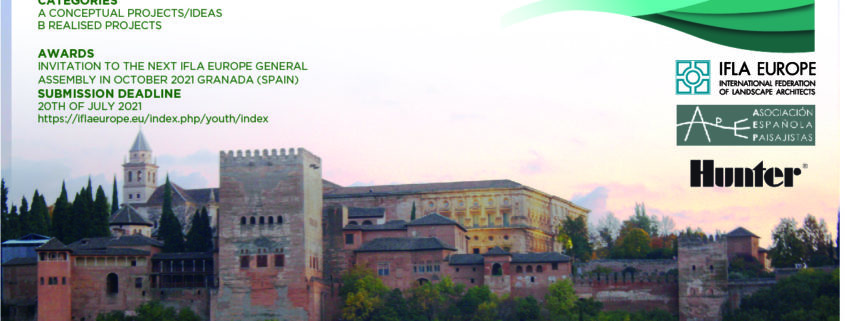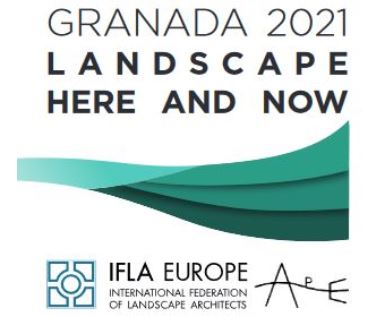IFLA Europe Student and Youth Competition
 Doel van de wedstrijd
Doel van de wedstrijd
IFLA Europe Students and Young Professionals Competition geeft je de kans om je projecten en ideeën te delen met IFLA Europe, zijn leden – 34 Nationale Associaties – en landschapsarchitecten in heel Europa.
Het doel van de wedstrijd is om studenten landschapsarchitectuur en jonge professionals te helpen bekendheid te krijgen voor hun projecten en werk. Elke Europese landschapsarchitect (student ingeschreven in een Europees landschapsarchitectuurprogramma of een beroepsbeoefenaar jonger dan 35 jaar) die lid is van een van de IFLA Europe National Associations kan zijn project – “inzending” – indienen. Deze inzending zal zowel online als in gedrukte vorm beschikbaar zijn.
THE LANDSCAPE IS NOW
We live uncertain times. 2020 will make history as the year where we experience and suffer, all around the world, the costs of climate change and biodiversity lost, and the relationships between urban planning and humans health. During some months, we put our lives in the center and we join strengths to get ahead. We also finally understand the urgency to change the way we interact with the environment. We verified, on the ground, that science was not wrong.
We can see the consequences of the alteration of the air quality, the water cycle and the environments. Everything is connected: the health and the extinct animal species, the hunger in the world and the soil depletion, the migrations and the water war. Meanwhile a part of the world wastes resources, the other part doesn’t have the minimum to live..
The climate emergency forces developed countries to act: for social justice, for environmental ethics, for survival… We must proceed now and do it two directions. On one side, drastically reduce greenhouse gas emissions, on the other to regenerate forest, soils, seas and biodiversity. Taking care of other species is also taking care of ours there is no trace of doubt, and no time to lose.
Urban, agrarian and rural, coastal and natural landscapes require, today more than ever, adequate protection, planning and management, as stated in the European Landscape Convention in 2000. More recently, the Paris Agreement and the United Nations 2030 Agenda outlined a clear roadmap to curb climate change. Mitigation and adaptation specify measures to reduce greenhouse gases, on the one hand, and to adapt our environment to new climate scenarios, on the other. The next decade will be decisive. The landscape is in the center of all eyes and landscape architects have a lot to contribute.
THE LANDSCAPE IS HERE
According to UN data, cities are home to more than 55% of the world’s population, 70% of carbon emissions are produced and this is where 828 million people live in slums. In 2050 the world population will reach 9.7 billion. All of this poses significant environmental and social challenges, especially in urban settings. In addition, they are closely linked to the abandonment of the rural area, which translates into an enormous loss of natural and cultural heritage.
Improving the quality of life of citizens requires creating healthy spaces designed by and for people. Green infrastructure, urban forests, streets and small parks, squares and gardens can meet many of these needs when nature-based solutions are applied. At the same time, the recovery of the rural world is announced as part of the solution to overcome the current eco-social crisis. Working in multidisciplinary teams in the analysis of the geographical, social and identity conditioning factors of a place is the only way to apply the most accurate project measures and decisions for each case.
Landscape architecture, an academic and project discipline with more than 120 years of history, knows well the principles that govern natural, social and cultural processes. Making natural and human dynamics compatible is inherent to the landscape architect´s work. We play with an advantage. Holistically analyze the characteristics and needs of the place, generate spaces of high environmental quality and improve the quality of life of individuals and communities, preserving the local character, are the principles that govern the best landscape architecture projects.

 IFLA Europe
IFLA Europe Doel van de wedstrijd
Doel van de wedstrijd


 ABAJP
ABAJP